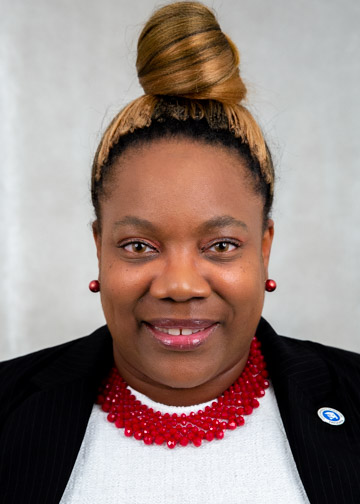Facilitator: Vicki T. Sapp, PhD, Chief Diversity, Equity, and Inclusion Officer, Title IX Coordinator, Affirmative Action and ADA Compliance Officer at SUNY Fredonia
This series is sponsored by the Office of Diversity, Equity, and Inclusion and the Professional Development Center.
Part I: Trauma is REAL: Understanding and Interrupting Microaggressions
Microaggressions are more than just race related. Columbia professor Dr. Derald Sue (1997) refers to microaggressions as “brief and commonplace daily verbal, nonverbal, or environmental slights, snubs, or insults, whether intentional or unintentional, which communicate hostile, derogatory, or negative messages toward people of color."
In this training Dr. Sapp will have participants examine the trauma individuals experience based on the impact microaggressions have on targeted people, based solely upon their marginalized group membership. She will provide a list of marginalized and dominate groups and examples of everyday instances of microaggressions. Additionally, Dr. Sapp will engage participants in group reflection and processing. By the end of Dr. Sapp’s workshop, participants will be able to understand how microaggressions impact the mental health of communities; recognize and identify a variety of ways to address microaggressions, both as the receiver and the bystander; and practice a range of practical strategies to use to mitigate biases in a variety of contexts.
Learning objectives:
By the end of this training participants will be able to:
- examine how people from various marginalized groups experience microaggressions and their impact.
- discuss a variety of ways to address microaggressions, both as the receiver and the bystander.
- practice a range of practical strategies to use in a variety of contexts.
Part II: Microaggressions: Reframing and Navigating Triggering Events Case Scenarios
In this training Dr. Sapp will have participants examine case scenarios. Participants will engage in large and small group discussions to identify the bias in each scenario. Participants will be encouraged to apply the tools learned in Part I of the series, and activate their own toolkits to work collaboratively to develop concrete ways to mitigate bias in each scenario.
Learning objectives:
By the end of this training participants will be able to:
- develop the ability to closely inspect our first impressions of bias
- examine how experiences and identities shape our biases
- understand how bias functions in our day-to-day interactions and how our biases impact our decision-making
- identify concrete ways based on their talents, skills and abilities to commit to mitigate bias.
Part III: Intersectionality: Examining Concepts of Privilege
In this training participants will complete pre-work through self-directed learning. During the training
Dr. Sapp will provide definitions of terms such as institutional power, 4-levels of oppression, privilege, and others. Participants will be expected to draw on lessons learned, tools used in Part I and part II, and new activities introduced in this training to examine the complexities of their own identities. The selected activities for this training are not designed to make participants feel guilty or ashamed about having or not having privilege, but rather to explore how we ALL have SOME privilege and to learn how to engage our privilege to determine if we want to be an actor, ally and/or accomplice when navigating spaces.
Learning objectives:
By the end of this training participants will be able to:
- develop an understanding of the concepts of privilege
- reflect on the impact of privilege on one’s own life
- engage in discussions to compare the effects of implicit bias and privilege.

Dr. Vicki T. Sapp has over 20 years of experience in higher education and 15 have been directly focused on inclusion, diversity, equity, access, and social justice. She earned her bachelor’s degree in Psychology and a master’s degree in Student Personnel Administration from SUNY Buffalo State College, and her Ph.D. in Higher Education Leadership and Policy from the University of Rochester (N.Y.).
Dr. Sapp has taught at the University of Rochester, Canisius College, the University of Buffalo, and SUNY Cortland. She also served as the Assistant Director of Housing Services at Capstone on Campus Management (COCM) in College Park, Maryland. Other career appointments include Director of Community and Organizational Development at the University of Rhode Island, Assistant Director of the Office of Residential Life and Housing Services at the University of Rochester, Associate Director of the Intercultural and Diversity Center at the University at Buffalo and Coordinator for Multicultural Affairs at SUNY Cortland.
Dr. Sapp is responsible for bringing the Safe Zone (LGBTQA+) project to Geisinger Commonwealth. Additionally, she trained, coordinated, and was responsible for the design and continuous enhancement of the Professional Identity Formation Cultural Humility Curriculum. She is certified as a Title IX Resources Advisor, Emotional Intelligent Coach, Green Dot Sexual Assault Bystander Intervene Trainer, Mental Health First Aid Trainer and Cook Ross Implicit Bias Trainer. She recently completed the University of South Florida Diversity Certificate.
In addition, Dr. Sapp has served as a member on several boards including: the Geisinger Diversity and Inclusion Council, Black Scranton Project Center for Arts and Culture, Northeastern Pennsylvania Diversity Education Consortium (NEPDEC), and NEPA Rainbow Alliance. She is also a proud member of Delta Sigma Theta Sorority, Inc.
The mission of the Office of Diversity, Equity, and Inclusion is to ensure that the university community understands and complies with both federal and state laws with respect to equal employment opportunity and affirmative action. While equal employment opportunity is the law, affirmative action and diversity issues require the university not only to provide access to employment and educational programs, but also to provide equitable opportunities to promote success.
The primary goal of the Office of Diversity, Equity, and Inclusion is to create a campus climate that is favorable to the development of the human potential of all faculty, staff, administrators, and students. To achieve this goal, the office has three major responsibilities: compliance, equity of services, and diversity.
For more information on services and contact information, please visit the Office of Diversity, Equity, and Inclusion's website.

